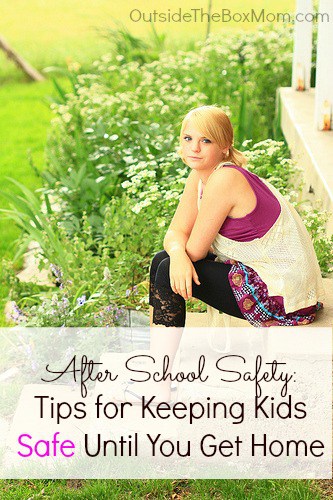Leaving children alone at home requires rules, trial & error, and safety precautions.

Keeping your kids safe during the school year doesn’t end when the bell rings at 3:00 p.m. If you’re like hundreds of thousands of American working parents, you can’t always be home when the bus drops off your kids. According to familyeducation.com, more than 14 million American students (about 26 percent of all students) leave school each day without anyone at home waiting for them. If this is your situations, below are a few tips for keeping your kids safe for those couple of hours until you get off work and get home to them:
1. Set rigid ground rules. You can’t expect your middle school-age child to make wise decisions when left to his own devices. Their brains just aren’t developed well enough for that and they don’t have the experience. Avoid their having to decide what’s okay and what’s not by writing, discussing and posting the after-school ground rules. Be firm and inflexible except for the most extraordinary of situations.
Things you’ll want to address include checking in with you when they arrive home, bringing others home from school with them, answering the door and telephone and behaviors like what to eat (not all junk food), what to do (homework, not video games) and what to do in an emergency.
2. Start out gradually. Help both you and your child get used to their being home alone by working up to the full two or three after-school hours. Use the time before school starts to gradually lengthen the time you leave your son by himself. Start, for example, with 20 to 30 minutes alone while you run errands. Extend the time in a few days to an hour. After each trip, discuss with him any concerns you and he might have about being alone.
3. Discuss safety. Having your child at home alone exposes them to a variety of situations that you’d normally deal with were you at home. Make sure that they have a list of emergency telephone numbers (fire, police, neighbor, etc.) where they can find them easily. Depending on their age, show them simple household issues, like how to turn on a breaker that’s tripped or how to turn off the water valve on an over-flowing toilet. If you have a whole-house alarm system, make sure that they are comfortable with turning it off and on and suggest they set the alarm again once they are save inside the house.
Of course, cautioning your child about strangers is part of getting them ready to stay home alone. Advise them to NEVER open the door to someone they don’t know. It’s also a bad idea to broadcast the fact that they are home alone every day after school. This can be done innocently on Facebook or other social media sites. Make sure that your child realizes the implications of such posts.
4. Consider an organized after-school program. Left to their own devices, children are more likely to get into trouble after school. In fact, teen violence is 50 percent higher on the average in the hours between 3:00 p.m. and 6:00 p.m. than during the rest of the day, according to family education.com. Most communities offer organized, after-school programs where your child can enjoy the company of other kids, be safe and learn something, too. There are also a number of church-based programs.
5. Enlist the help of friends and family. Remember it takes a village to raise a child. Don’t be ashamed or embarrassed to ask for help from family members or friends who are available during those after school hours. Letting a trusted next-door neighbor know that your son or daughter will be home alone after school can give you another set of eyes. You can also ask an aunt or grandparent to call and check in with your child periodically, just to make sure everything is okay. Children may confide things to a relative or family friend that they wouldn’t tell their parents.
6. Enroll your child in a first aid course. It’s always better to be prepared for an emergency. Make sure that your child is ready for common household accidents by enrolling her in a community first aid training course. Girl Scout programs (and Boy Scout programs) often sponsor such classes as do local Red Cross branches and community centers. What your child learns can also help others in the community. You never know when you’re going to happen upon someone at school or church who needs first aid.
Trusting your child to be home by himself after school can be a learning and growing experience for him–and for you. Just make sure that you leave him with the information and the tools he needs to feel confident and secure until you get home from work.
More After School Resources
- 6 Best After-School Activities for Your Child
- After School Safety: Tips for Keeps Kids Safe Until You Get Home
- Easy After School Snacks
- Keeping Kids Safe in the Critical Before & After School Hours
- How to Protect Your Home Against Intrusion
- Easy Home Security Tips Every Parent Should Teach Their Kids
Sandy Mitchell lives in the heart of Ohio’s wine country, where she’s a homeowner, landlord, and organic gardener. She is also a regular contributor to the Ross Feller Casey, LLP blog, where shares her advice on family safety and health issues.
Photo Credit: D Sharon Pruitt
[…] (If your child is old enough) Have your child stay at home alone […]